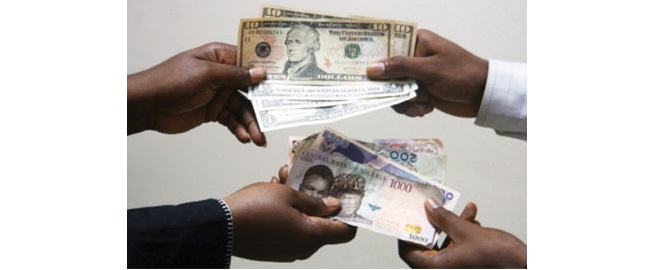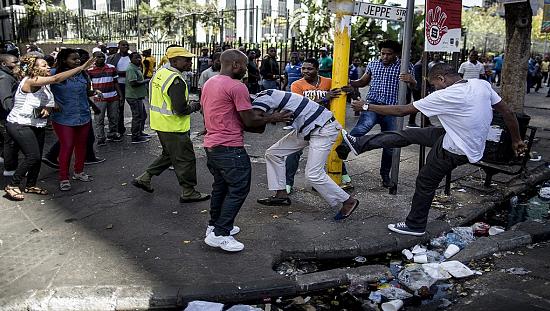It’s a bitter medicine we’ve been forced to take. The Central Bank of Nigeria and many Nigerians (including me) have been uncomfortable with the idea of allowing market forces to determine the exchange rate of the naira. The debate has been going on for at least 30 years – it preceded SAP and other experiments of the Ibrahim Babangida regime. Professor Sam Aluko was one of the seasoned economists on our side then.
Now, the dispute has ended. The CBN has defended the naira, against the wishes of the IMF/World Bank, foreign investors and western economists that loathed “economic folly”. I must congratulate the monetary authorities on holding on for so long despite intense pressure. Buffeted by low oil prices, a lack of local production (caused mainly by power scarcity and corruption) and Nigerians’ insatiable appetite for foreign-made goods, the country has no choice now. The pro-market forces have won.
From tomorrow, I guess, the foreign exchange market in Nigeria will be the most-watched market in the world. The CBN might have yielded to pressure, but it hopes to mediate in the market from time to time. It’s a patriotic duty – guided deregulation. However, unless Nigerians begin to show discriminatory taste for local goods and services, the naira will continue to depreciate. The naira’s weakness is well known: a consumer nation is a weak nation. Left to the vagaries of market forces, the naira can only go one way – down. That’s why, after CBN governor Godwin Emefiele’s announcement on Wednesday, a dollar rose from N340 to N370 at the autonomous market. This week, at the single-window market, the CBN may still attempt to defend the naira by pushing out much forex. In the weeks ahead, however, the apex bank’s intervention would have little effect, unless oil prices rose to $100 per barrel.
The “black” or parallel market will not disappear after tomorrow. So long as there are insufficient dollars and pounds, importers and other forex hunters will buy from the black market. And that raises a recurring question: who supplies dollars to the black market? Where do the “Mallams” found at Broad Street and Yaba of Lagos, near a popular hotel in Abuja, and around many airports get the dollars and pounds they trade in? They are obviously funded by banks, fake importers, drug dealers and smugglers. If, therefore, the CBN floats the dollar at N250/N260, as it has promised the president, tomorrow, the black market is sure to thrive. Those who will get the dollar for N250 will almost certainly divert it to the black market. To discourage patrons of the black market, the CBN should have started from N400 tomorrow!
I don’t pray for the dollar to cost N500 or even N1, 000 as many expect it will someday. But we have reached a stage we shouldn’t be afraid of the consequences of any economic policy anymore. Prices of goods and services have already hit the roof, far above what most Nigerians can afford. The prices are not likely to increase much more. Importers will soon find that they won’t get buyers for overpriced goods; they will bring prices down or be forced out of business. Even fuel sellers have discovered that demand for the essential commodity has dropped since a litre of petrol was increased from N86 to N145. That’s the beauty of market forces.
But how long shall we endure the hard times? I expect the battle between demand for and supply of forex to last no longer than one year from now. At the end of the day, Nigerians would begin to face reality. Already, inflation has forced most of us to be frugal with our scarce resources. There are fewer lavish parties, spending sprees and exotic cars.
However, I expect prices to come down after reaching a climax – maybe when the dollar hits N600. Civil servants and other salaried workers would become poorer, even if they got a pay rise. [A relation has calculated that the cost of fuelling his car for a month is more than his monthly salary.] And what will workers who have no access to extra cash (thanks to the TSA) do? I hope many will start leaving government jobs and going into farming or trading. The illusion of petro-dollars is being cleared.
The inevitable slaughter of the naira will teach us this: any nation that seeks to develop must produce the goods it consumes and also have extra to export. There are no short-cuts. We have depended on oil for too long; now, we must reform or perish.
The CBN and its group of 10 primary dealers (or all banks, I heard) should prioritise imports that will be receiving forex. Top on my list are equipment or facilities needed for solving the power problem. I’m convinced that power supply is the best indicator of a nation’s progress. Without adequate and regular power, there would be little manufacturing and many other businesses. There would be no jobs. Life would be hellish for most people. Next on my list are essential medicines and hospital facilities. Agricultural machinery and fertilisers are next.
It’s time for us to awaken the giants in us. Let struggling parents bring their children studying abroad home. Let pharmaceutical companies and scientists exploit Nigerian roots and herbs. Tax collectors and anti-graft agencies should prepare to tackle those with questionable wealth. It’s time to re-introduce the death penalty for drug peddling. And let every Nigerian be proud of every product bearing the inscription “Made in Nigeria”. Change has truly come to Nigeria.
***
Buhari for the Nation
President Buhari is expected home today, after a two-week vacation in London. I’m sure he’s coming home healthier and stronger. There is no need to worry over his health condition anymore. Almost everyone manages one health condition or the other after age 50. If Robert Mugabe can still rule Zimbabwe effectively at age 92, why can’t Buhari call the shots in Nigeria at age 73? The Nigerian leader has not even reached Nelson Mandela’s age when he was elected president of South Africa in 1994.
Nigeria needs President Buhari’s attention badly. He is returning to a nation in a state of emergency in almost all areas. He can’t handle them alone: the last thing a septuagenarian needs is stress! A lot will therefore depend on his lieutenants.
Let the president steer the ship of state towards calmer waters by setting achievable targets for his cabinet members. It’s disturbing, for instance, that the planting season for this year is ending soon without any visible achievement in the agriculture sector; yet many Nigerians are starving and unable to buy food items or treat their ailments in hospitals. We’ve had enough of conferences and seminars where “great” speakers build castles in the air. Those in Buhari’s government who still talk about what they will do rather than what they have done are drawing contempt to themselves.
–By ANIEBO NWAMU
#













